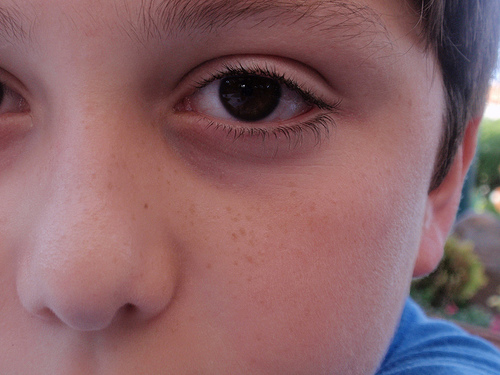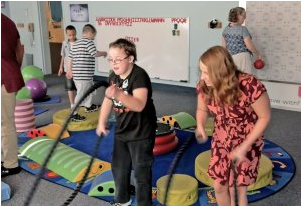
“Neurodivergence is a form of human diversity,” says Julia Barnes, PhD, a child and adolescent psychologist at the Pediatric Mental Health Institute at Children’s Hospital Colorado. “Just like there’s no normal, correct or superior race, gender, ethnicity or culture, there’s no one normal, right or superior type of brain.”
Neurotypical, on the other hand, broadly refers to people who are not neurodivergent. Their brain functions and behaviors are often considered the norm in our society, and as such, our environments, like schools and workplaces, tend to accommodate this group of people.
What conditions fall under the term “neurodiversity”?
Because neurodiversity is not a medical diagnosis, there is not one definitive list of conditions that are included under this umbrella term. Typically, individuals who identify as neurodiverse may have one or more of the following diagnoses:
- Autism spectrum disorder
- Attention deficit/hyperactivity disorder
- Learning disabilities, such as dyslexia, dyscalculia, dysgraphia and dyspraxia
- Tourette syndrome and other tic disorders
- Sensory processing issues

It’s common for neurodivergent people to have co-occurring conditions, or more than one diagnosis. Also, as a child grows up and faces new challenges, it’s possible that their initial diagnosis might change, or they might receive additional diagnoses.
How can I tell if my child is neurodivergent?
Like many things in parenting, it often starts with a gut feeling. While some signs might be apparent when a child is as young as 9 to 12 months old, such as not making eye contact or responding to their name, many parents first recognize concerns in social settings when their child is in preschool or kindergarten.
As a child begins navigating the demands of school, a caregiver or teacher might note that they’re not performing well academically, are easily distracted, are noticeably distressed or simply acting differently than neurotypical children. “If a child is just not clicking with their environment, then I think it’s totally reasonable to have them evaluated to figure out what this kiddo needs to help them thrive in school,” Barnes says.
My child has sensory processing issues. Does that mean they’re neurodivergent?
Many children, but not all, who are diagnosed with autism spectrum disorder and ADHD experience some sensory difficulties. This means that they are over-responsive (hypersensitive) or under-responsive (hyposensitive) to sensory stimulation, such as bright overhead lights or loud street noises.
As a child begins navigating the demands of school, a caregiver or teacher might note that they’re not performing well academically, are easily distracted, are noticeably distressed or simply acting differently than neurotypical children.
Oftentimes, a child might be hypersensitive in one area, but hyposensitive in another. Sensory processing challenges can impact a child’s five senses — sight, hearing, touch, smell or taste — as well as their balance and coordination (vestibular), external body awareness (proprioception) and internal cues and signals (interoception).

Children with sensory processing sensitivities showcase a wide range of reactions and behaviors that can be confusing for parents. Some of these behaviors include:
- Excessive movement, including running, jumping, spinning or purposely crashing into things
- Hand-flapping or rocking back and forth
- Covering ears or eyes to reduce external stimuli
- Frequent touching or discomfort with being touched
- Dislike of certain items of clothing or textures (or even tags or seams inside of clothing)
- Meltdowns in response to disliked sensory stimulation
What should I do if I think my child might be neurodivergent?
Start with your child’s primary care provider. Autism and ADHD can have similar characteristics and also regularly occur together, so it is always important to bring your concerns to a trusted medical professional for discussion and evaluation.
How to advocate for your neurodivergent child
It’s crucial that caregivers advocate for their child to ensure they’re getting the support they need, both in healthcare and educational settings. Just because a child has a medical diagnosis of a certain condition doesn’t mean they’ll automatically receive the support they need at school.
Oftentimes, a child will need to undergo additional screening at their school to be considered for an Individualized Education Plan (IEP) or 504 education plan, which allows for accommodations to help them succeed in the classroom.

Interested in learning more about neurodivergence? Check out our podcast in which we explore the nuanced world of neurodevelopmental disorders.
Supporting your neurodivergent child at home and in school
At home, parents can support their neurodivergent child by giving them a safe space to be themselves and meeting their unique needs, whatever that might mean. Give them plenty of time to explore their interests and plan activities that suit their sensory preferences.
You can also work with your child’s teacher to see if your child can utilize a fidget toy during class to help them concentrate or wear earplugs or headphones to reduce noise.
Excerpted from “A Parent’s Guide to Neurodiversity” from Children’s Hospital Colorado. Read the full article online.
Source: Children’s Hospital Colorado | A Parent’s Guide to Neurodiversity, https://www.childrenscolorado.org/just-ask-childrens/articles/neurodiversity | copyright 2025. Retrieved April 2025.





